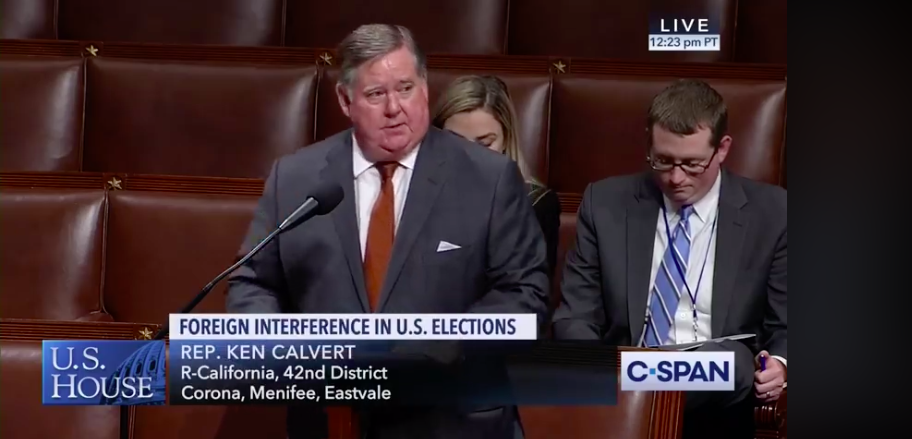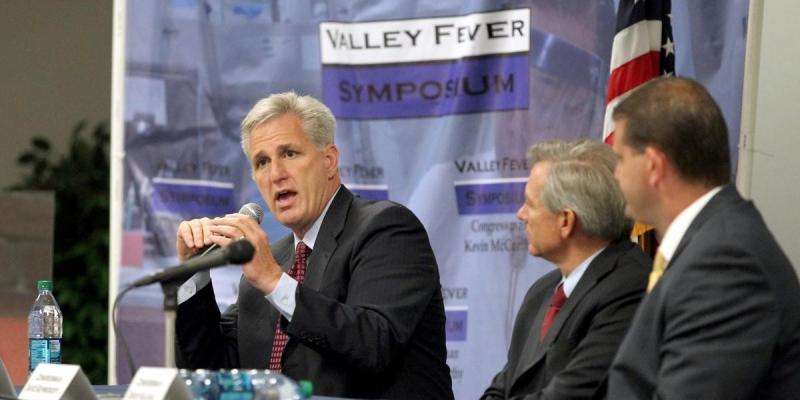
Rep. Ken Calvert (R-CA). (C-SPAN)
House Rejects CA Congressman’s Amendment On A Bill To Stop Foreign Interference In Elections
‘There are no requirements to document the chain of command of ballots’
By Michelle Mears, October 28, 2019 7:20 am
The House blocked an amendment to a bill last week that would have increased the integrity of elections across the nation.
Congressman Ken Calvert from California spoke on the house floor addressing the practice called Ballot Harvesting. A few states have allowed this process for collecting votes including California, and Calvert is calling foul. The Democrat-controlled House is led by leaders who have been accusing President Donald Trump and his administration of stealing the 2016 elections with the aid of Russians, rejected the amendment.
“This isn’t the Wild West. We shouldn’t wait for fraud and abuse to occur before we react. By rejecting this amendment Democrats have not only left the door open to involvement from foreign nationals in our elections they have welcomed it,” said Calvert. “The bill under consideration was an attempt to protect our election from foreign interference. It is a weakness that basically rolls out the red carpet to foreign interference.”
The California Congressman’s concerns were first raised after the November 2018 elections when Republicans were blindsided.
California legalized the practice known as ballot harvesting under Governor Jerry Brown in 2016. It is a practice where third parties may collect the vote by ballots of any individual when they changed Section 3017 of the Election Code. The only restriction written into the law was a prohibition on compensating an individual based on the number ballots that person returns.
California Election Code 3011(c) states “ballots shall not be disqualified solely because the person authorized to return it did not provide on the identification envelope his or her name, relationship to the voter, or signature.”
In March, the Riverside County of Registrars of Voters confirmed in a letter that ballot harvesting played a role in winning elections. The practice explained several mysteries of how mail-in ballots caused massive shifts toward Democrats in races Republicans thought they won on Election Night; why Republicans won the turnout battle in the primary, but lost it in the general election; and why Democrats with party backing defeated fellow Democrats without it — even when the latter had more money.
The San Francisco Chronicle reported that Democratic Party operatives used the surprise tactic in the general election and it made a difference. Winning the seven seats in California was vital to the Democrats taking control of Congress and having Nancy Pelosi Speaker of the House in 2018.
“My worst fears about the dangers of ballot harvesting have been confirmed,” said Rep. Calvert. “The question of voter fraud stemming from ballot harvesting in California is a matter of when – not if. Democrats in Sacramento have made it legal for foreign nationals and illegal immigrants to collect an unlimited number of ballots with absolutely no transparency requirements. Democrats have removed basic safeguards in place to protect the integrity of our elections just to give themselves a political advantage.”
Aja Smith was a candidate who ran for congress in 2018 against incumbent Mark Takano. Smith saw a dramatic shift in votes after the primaries and told the California Globe in a recent interview, “In 2018 I was building momentum in the polls it was a great experience. But, we were blindsided by the ballot harvesting,” said Smith who reported in the primary she had 41 percent of the votes, but in November Takano took 66 percent of votes. Smith a veteran is running again against Takano in 2020. Smith said she is better prepared to fight for the seat and will not be blindsided.
The Riverside County of Registrars of Voters wrote the following in a letter to Calvert:
A vote by mail ballot collected by a ballot harvester does NOT have to include the name or signature of the harvester on the identification envelope in order to be valid.*
A ballot harvester is NOT required to document the vote by mail ballots chain of custody in any way.
A ballot harvester is NOT required to disclose to a voter who they are working on behalf of or if they are being paid to collect ballots.
A ballot harvester is NOT required to provide any kind of documentation/receipt when collecting a vote by mail ballot.
Election officials are NOT required to obtain any identifying information, including names, of ballot harvesters when they return collected ballots.
Election officials are NOT required to maintain a list of persons who collect and submit collected ballots, regardless of how many ballots they submit.
ANY individual is eligible to harvest ballots, including:
-
- Non-California residents
- Illegal immigrants
- Foreign nationals
ANY entity may have and compensate its employees to harvest ballots (so long as the compensation is not on a per ballot basis), including:
-
- Campaigns
- Non-profit organizations
- Businesses, including corporations
- Labor unions
- Churches
Steven F. Huefner, a law professor from Moritz College of Law at The Ohio State University, wrote the four ways in which ballot harvesting by political operatives increases the risk of voting fraud:
- Ballot harvesters can destroy or discard ballots from those whom they know or believe voted for the “wrong” candidate.
- Ballot harvesters can collect ballots in unsealed envelopes, or open sealed envelopes, and either alter votes or fill in blank portions of undervoted ballots (those in which the voter did not vote in some races).
- Ballot harvesters can exert improper influence on voters while the voters are completing their ballots.
- Ballot harvesters can collect unfilled ballots and fill them in themselves.
Calvert ended his speech on the floor saying, “There are no requirements to document the chain of command of ballots. There is nothing in the California law prohibiting foreign nationals from collecting and handling ballots. Let me repeat that, ……….In reality, the only rule is there are no rules.”




